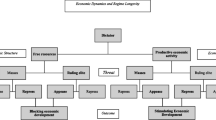Abstract
A series of critical developments in Turkish politics from 2007 has signalled a historic shift in the use of power in the country, long controlled by the staunch and virtually autonomous bureaucracy, both military and civilian, in the face of fragile civilian politics. A unique leverage used by civilian politics in bringing about the change has been the discourse of Europeanization. Originally a project that was part and parcel of the identity politics of the bureaucracy from the nineteenth century, the discourse seems to have been appropriated by forces defiant of the bureaucratic rule to reconfigure access to power. This shift in power may amount to nothing less than a regime change, completed and sealed in the last general election in June 2011, although it remains to be seen whether the new regime, as yet amorphous, will deliver the improved democracy it promises.
Similar content being viewed by others
Notes
Two public surveys in 2011 hint at the size of the pro-bureaucracy camp in society. According to a public opinion survey, commissioned by the National Democratic Institute of the United States, 39 per cent of the respondents approve of a military takeover, ‘when needed’ (Berkan, 2011). Another survey, conducted by the Turkish Metropoll, puts the figure at 34 per cent (Ilicak, 2011). Yet, the fact that some of these respondents ostensibly vote for the ruling AKP (Party for Justice and Development), which is known to be anti-bureaucracy, rules out a clear polarization on this point alone. The main opposition party, CHP (Peoples’ Republican Party), which is traditionally associated with the bureaucratic rule in the country, and yet has come recently to denounce military interventions as part of its newly emerging, democratic policy, received about 26 per cent of the overall votes in the last general election in June 2011.
The landmark decision by the European Union to start negotiations with Turkey came in December 2004 (European Council, 2004, par. 22). Next, in October 2005, the organization adopted a Negotiating Framework document, outlining the procedure for negotiations. The actual negotiations between the sides, with frequent setbacks to follow, commenced on 12 June 2006.
For this and the accompanying realignment in Turkish politics, which seems to have brought Kemalists and Islamists together, see Polat (2006).
See, for the strain in the Turkish political culture known as ‘the Sevrès syndrome’, Jung (2001) and Guida (2008).
See, for this form of neo-nationalism in Turkey, which emerged from the late 1990s and seems presently to be the ideology of the pro-bureaucracy camp, Uslu (2008).
But see, for a reading of these meetings as a new secularist concern that is popular rather than military, Tambar (2009).
But see, for a sceptical view, Jenkins (2009).
On these critics of the old regime, see Karaveli (2010).
A recently leaked US embassy cable, released by daily Taraf, WikiLeaks's Turkish partner, vividly describes the systemic disempowerment of democratic politics in Turkey, denying it genuine power. According to the cable despatched on 15 November 2002, only days after the AKP came into power, a former member of the National Security Council, the constitutional body formed mostly by commanders of sections in the armed forces, told the US Ambassador Robert Pearson that elected governments are ‘nothing but servants of the deep state’. The ‘deep state’ is explained in the cable as ‘the behind-the-curtain power relations between the choice members of the military, judiciary and the bureaucratic elite’. The cable also mentions the links of the deep state to the mafia, terrorist groups and the media, presently in the midst of a set of anti-coup trials in Turkey (see the text accompanying note 7 above). The judiciary, the cable goes on to state, is a tool of the Kemalist status quo, rather than independent and impartial as would be expected, to the extent that is ‘hard to comprehend for Americans’ (Taraf, 21 March 2011).
On the democratic control of armed forces in Turkey in the light of new measures, see Toktas and Kurt (2010).
See the judgement of the Grand Chamber in the case Leyla Sahin vs. Turkey (2005). There is no formal law in Turkey for the ban, but the ECtHR treated the high court decisions in Turkey upholding the ban by universities as part of a ‘substantive’ law that met the requirement of lawfulness sought by the ECtHR in the restriction of rights by public authority.
See, for a full statement of this view by the ECtHR on the imminence of fundamentalist threat in Turkey for its specific history, Refah Partisi vs. Turkey (2001), paragraph 65.
See, for the grievances of non-Muslims Turks in terms of employment in civil service under the established order, Benhabib (2009).
See, for a study on the historical Kemalist politics of identity, Cagaptay (2006).
Turkish scholar Baskin Oran, an expert on minorities in modern Turkey, was forced to defend himself in a criminal case in 2006 for authoring an officially commissioned (yet eventually prosecuted) minority rights report in which he questioned established reflexes on Turkish identity towards a solution to Turkey's Kurdish problem. In the highly publicized hearings, Oran (2007, p. 24) pointed out this continuity with the Ottoman heritage in the prosecutor's indictment against him. Over the years, Oran has repeatedly highlighted the fact that in several cases the Kemalist judicial establishment has displayed the ironic parapraxis of referring to non-Muslim Turkish nationals as ‘aliens’.
In the subsequent elections, in April and June 2011, within these judicial bodies for key internal posts, namely a President and a Chief Public Prosecutor for the Court of Cassation, and a President for the Council of State, most new members appear to have voted en bloc, greatly disrupting the settled Kemalist control of these institutions (Milliyet, 30 April 2011 and 8 June 2011; Hurriyet, 8 June 2011).
A close examination of the domestic policy on Europe from the late 1950s, which has dispelled some of the long-standing myths on the subject, and has inspired the discussion here, is to be found in Calis (2006, pp. 49–191).
On contending modernities in the republican Turkey, see Cinar (2005) and Kaya (2004). And see, for the earlier debate on modernity, Hanioglu (2008).
References
Ahmad, F. (1993) The Making of Modern Turkey. London and New York: Routledge.
Altan, A. (2012a) CHP nasil kurtulur. [Way out for CHP] Taraf [Turkish daily] 3 February.
Altan, A. (2012b) Kemalist bir basbakan. [A Kemalist premier] Taraf [Turkish daily] 4 February.
Aydinli, E. (2009) A paradigmatic shift for the Turkish generals and an end to the coup era in Turkey. The Middle East Journal 63 (4): 581–596.
Benhabib, S. (2009) Turkey's constitutional zigzags. Dissent 56 (1): 26–27.
Berkan, I. (2011) Vatandasa gore demokrasi eksikli. [People find democracy flawed] Hurriyet [Turkish daily] 20 May.
Cagaptay, S. (2006) Islam, Secularism and Nationalism: Who is a Turk? London and New York: Routledge.
Calis, S.H. (2006) Turkiye-Avrupa Birligi Iliskileri, [Turkey-European Union Relations]. Ankara: Nobel.
Cinar, A. (2005) Modernity, Islam, and Secularism in Turkey: Bodies, Places, and Time. Minneapolis, MN: University of Minnesota Press.
Cizre, U. (2008) Secular and Islamic Politics in Turkey: The Making of the Justice and Development Party. London and New York: Routledge.
Cizre, U. and Walker, J. (2010) Conceiving the new Turkey after Ergenekon. The International Spectator 45 (1): 89–98.
European Commission. (2010) Turkey Progress Report. Online at ec.europa.eu/enlargement/pdf/key_documents/2010/package/tr_rapport_2010_en.pdf.
European Council. (2004) The conclusions of the Brussels European Council. 16–17 December. Online at www.europa.eu.int/comm/councils/bx20041216/index_en.htm.
Faucompret, E. and Konings, J. (2008) Turkish Accession to the EU: Satisfying the Copenhagen Criteria. London and New York: Routledge.
Guida, M. (2008) The Sevrès syndrome and ‘komplo’ theories in the Islamist and secular press. Turkish Studies 9 (1): 37–52.
Hale, W. (1994) Turkish Politics and the Military. London and New York: Routledge.
Hale, W. and Ozbudun, E. (2010) Islamism, Democracy and Liberalism in Turkey: The Case of the AKP. London and New York: Routledge.
Hanioglu, S. (2008) A Brief History of the Late Ottoman Empire. Princeton, NJ: Princeton University Press.
Heper, M. (2007) The State and Kurds in Turkey: The Question of Assimilation. London: Palgrave Macmillan.
Hurriyet [Turkish daily] (2011) Cumhuriyet tarihinde bir ilk [A first in the history of the Republic]; Danistay'in yeni baskani belli oldu [New President for the Council of State] 3 March and 8 June.
Ilicak, N. (2011) Gerekirse asker mudahale etsin. [The military should intervene when needed] Sabah [Turkish daily] 29 March.
Jenkins, G. (2009) Between Fact and Fantasy: Turkey's Ergenekon Investigation. Washington and Stockholm: Central Asia-Caucasus Institute Silk Road Paper.
Jung, D. (2001) ‘The Sevrès syndrome’: Turkish foreign policy and its historical legacy. In: B. Møller (ed.) Oil and Water: Co-operative Security in the Persian Gulf. London: I.B. Tauris, pp. 131–159.
Karaveli, H. (2010) An unfulfilled promise of enlightenment: Kemalism and its liberal critics. Turkish Studies 11 (1): 85–102.
Kaya, I. (2004) Social Theory and Later Modernities: The Turkish Experience. Liverpool, UK: Liverpool University Press.
Kaya, S. (2009) The rise and decline of the Turkish ‘deep state’: The Ergenekon case. Insight Turkey 11 (4): 99–113.
Marcus, A. (2007) Blood and Belief: The PKK and the Kurdish Fight for Independence. New York and London: New York University Press.
Mardin, S. (1973) Center-periphery relations: A key to Turkish politics? Daedalus 102 (1): 169–190.
Milliyet [Turkish daily] (2011) Cumhurbaskani Gul yeni Yargitay bassavcisini secti [President Gul appoints the new Chief Public Prosecutor for the Court of Cassation]; Danistay'in yeni baskani Karakullukcu oldu [Karakullukcu is the new President of the Council of State] 30 April and 8 June.
Oran, B. (2007) The minority report affair in Turkey. Regent Journal of International Law 5 (1): 1–93.
Ozcan, A.K. (2006) Turkey's Kurds: A Theoretical Analysis of the PKK and Abdullah Ocalan. London and New York: Routledge.
Polat, N. (2006) Identity politics and the domestic context of Turkey's European Union accession. Government and Opposition 41 (4): 512–533.
Polat, N. (2011) The anti-coup trials in Turkey: What exactly is going on? Mediterranean Politics 16 (1): 213–219.
Quataert, D. (2005) The Ottoman Empire: 1700–1922. Cambridge: Cambridge University Press.
Shankland, D. (2003) The Alevis in Turkey: The Emergence of a Secular Islamic Tradition. London and New York: Routledge.
Shenker, J. (2011) Turkey's PM rallies Arab world in Cairo with call for UN to recognise Palestine. The Guardian online, 13 September.
Tambar, K. (2009) Secular populism and the semiotics of the crowd in Turkey. Public Culture 21 (3): 517–537.
Taraf [Turkish daily] (2011) WikiLeaks Turkiye belgeleri [WikiLeaks Turkey documents] 21 March.
Telhami, S., Lebson, M., Lewis, E. and Medoff, A. (2011) Annual Arab Public Opinion Survey. University of Maryland Anwar Sadat chair for peace and development,Available at http://www.brookings.edu/~/media/Files/events/2011/1121_arab_public_opinion/20111121_arab_public_opinion.pdf.
Toktas, S. and Kurt, U. (2010) The Turkish military's autonomy, JDP rule and the EU reform process in the 2000s: An assessment of the Turkish version of democratic control of armed forces. Turkish Studies 11 (3): 387–403.
Uslu, E. (2008) Ulusalcilik: The neonationalist resurgence in Turkey. Turkish Studies 9 (1): 73–97.
Usul, A.R. (2011) Democracy in Turkey: The Impact of EU Political Conditionality. London and New York: Routledge.
Vatan [Turkish daily] (2012) ‘O senin isin degil’ [‘None of your business’] 4 February.
Yavuz, H. (2009) Secularism and Muslim Democracy in Turkey. Cambridge: Cambridge University Press.
Yildirim, B. (2008) Dagdaki coban ve Platon. [The mountain shepherd and Plato]. Radikal [Turkish daily] 6 May.
Zurcher, E.J. (1997) Turkey: A Modern History. London and New York: I.B. Tauris.
Acknowledgements
Research for this work was conducted under the auspices of the Centre for Contemporary Middle East Studies, University of Southern Denmark, Odense, where the author taught, as a ‘Guest Professor’, for two study terms in 2010 and 2011. The author also acknowledges Michael Cox and the two anonymous reviewers of the journal for insightful comments and suggestions.
Author information
Authors and Affiliations
Rights and permissions
About this article
Cite this article
Polat, N. Regime change in Turkey. Int Polit 50, 435–454 (2013). https://doi.org/10.1057/ip.2013.12
Published:
Issue Date:
DOI: https://doi.org/10.1057/ip.2013.12




